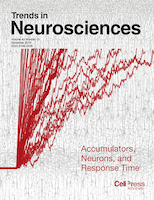
ZHURNAL VYSSHEI NERVNOI DEYATELNOSTI IMENI I P PAVLOVA
Scope & Guideline
Exploring the Complexities of Neural Mechanisms
Introduction
Aims and Scopes
- Neurobiological Mechanisms of Behavior:
Research exploring how various neurobiological processes underpin behavior, cognition, and emotional responses, often utilizing both human subjects and animal models. - Cognitive Neuroscience:
Investigations into the cognitive functions such as memory, attention, and perception, often employing techniques like EEG, MEG, and fMRI to understand the neural correlates of cognitive processes. - Neuroplasticity and Recovery:
Studies centered on the brain's ability to reorganize itself, particularly in response to injury or developmental changes, focusing on rehabilitation strategies and the underlying neurobiological mechanisms. - Psychopathology and Neurodevelopmental Disorders:
Exploration of the neurobiological underpinnings of various mental health conditions and neurodevelopmental disorders, employing both clinical and experimental approaches. - Methodological Innovations in Neuroscience:
Development and application of innovative methodologies for studying brain function, including brain-computer interfaces, neuroimaging techniques, and electrophysiological measures.
Trending and Emerging
- Neuroinflammation and Mental Health:
A rising focus on the role of neuroinflammation in various mental health conditions, emphasizing how immune responses in the brain can affect cognitive functions and emotional well-being. - Neurotechnology and Brain-Computer Interfaces:
An emerging interest in the application of neurotechnologies, particularly brain-computer interfaces, for rehabilitation and cognitive enhancement, reflecting advancements in technology and neuroscience. - Sex Differences in Neuroscience:
Increased attention to sex differences in brain function and behavior, highlighting the importance of gender as a variable in neurobiological research. - Psychobiotics and Gut-Brain Axis:
A growing body of work investigating the relationship between gut microbiota and brain function, exploring how dietary interventions may influence mental health outcomes. - Cognitive Aging and Neurodegeneration:
Research focusing on the cognitive aspects of aging, including studies on neurodegenerative diseases, is gaining traction, reflecting demographic trends and societal needs.
Declining or Waning
- Behavioral Studies in Non-Mammalian Species:
Research on non-mammalian models has decreased, possibly due to a growing emphasis on more directly relevant mammalian studies that can inform human neuroscience. - Pharmacological Interventions in Behavioral Studies:
The frequency of studies focusing solely on pharmacological interventions has waned, suggesting a possible shift towards integrated approaches that combine behavioral, neurobiological, and cognitive assessments. - Basic Mechanisms of Sensory Processing:
Investigations that focus exclusively on the basic mechanisms of sensory processing without linking to higher cognitive functions are becoming less common, indicating a trend towards more integrative research.
Similar Journals

INTERNATIONAL JOURNAL OF NEUROSCIENCE
Advancing the Frontiers of Neuroscience KnowledgeThe INTERNATIONAL JOURNAL OF NEUROSCIENCE, published by TAYLOR & FRANCIS LTD, stands as a vital resource in the field of neuroscience since its inception. With a proud history of publication from 1970 to 2024, this journal is committed to advancing knowledge in various domains of neuroscience, from fundamental research to clinical applications. It is indexed with an ISSN of 0020-7454 and an E-ISSN of 1563-5279, reflecting its wide reach and recognition. The journal maintains a respectable position in the academic landscape, categorized as Q2 in Medicine (miscellaneous) and Q3 in Neuroscience (miscellaneous) as of 2023, signifying its relevance among researchers and professionals. Although it currently does not offer open access, the journal remains a significant platform for disseminating groundbreaking research, thereby fostering collaboration and innovation within the neuroscience community. Located in the United Kingdom, the journal aims to bridge gaps in neuroscience knowledge, making it an essential reading for students, professionals, and researchers dedicated to unraveling the complexities of the nervous system.

Multisensory Research
Bridging Disciplines Through Sensory InnovationMultisensory Research is a premier academic journal published by BRILL, dedicated to advancing the fields of cognitive neuroscience, computer vision, and sensory systems. Established in the Netherlands, the journal boasts a diverse scope, exploring the integration of sensory modalities in both experimental and cognitive psychology. With its converged years extending from 2013 to 2024, Multisensory Research has consistently contributed valuable insights, earning a well-regarded position within various quartiles, notably Q2 in Computer Vision and Pattern Recognition and Q2 in Ophthalmology as of 2023. The journal’s rankings reflect its significant impact, with placements such as rank #50 in Ophthalmology and rank #84 in Experimental Psychology, highlighting its relevance to today's interdisciplinary research efforts. Available as an open-access platform, Multisensory Research ensures that innovative research is accessible to a wide audience, making it an essential resource for researchers, professionals, and students alike who are engaged in the dynamic study of multisensory integration.

TRENDS IN NEUROSCIENCES
Navigating the Evolving Landscape of NeuroscienceTRENDS IN NEUROSCIENCES, published by CELL PRESS, is a leading journal in the field of neuroscience, offering cutting-edge insights and important developments in the rapidly evolving landscape of brain research. With an impressive Impact Factor and ranking in the top quartile (Q1) of the category for Neuroscience (miscellaneous), it is positioned as a vital resource for researchers and professionals seeking to stay abreast of the latest discoveries and trends from 1978 to the present. Specifically ranked #3 out of 113 in General Neuroscience by Scopus, this journal promotes the interdisciplinary exchange of ideas and knowledge, making it an essential platform for students and experienced scholars alike. Although it is not an Open Access journal, its value lies in its rigorous peer-review process and commitment to maintaining the highest standards of academic integrity. By continuing to explore the complexities of neural processes and behavior, TRENDS IN NEUROSCIENCES plays a crucial role in shaping the future of neuroscience research and education.

NEUROREPORT
Connecting minds through groundbreaking neuroscience.NEUROREPORT is a distinguished journal in the field of neuroscience, published by Lippincott Williams & Wilkins. With an ISSN of 0959-4965 and an E-ISSN of 1473-558X, the journal has established itself as a vital platform for disseminating innovative research and developments in the dynamic area of neuroscience since its inception in 1990. Currently, it is positioned in the Q3 category of the 2023 Journal Rankings, reflecting its respectable standing within the community of neuroscience professionals, ranked #74 out of 113 in general neuroscience on Scopus, placing it in the 34th percentile. While it operates on a traditional subscription model, NEUROREPORT is committed to fostering knowledge sharing in the realm of neurobiology, neuropharmacology, and cognitive studies among researchers, professionals, and students alike. With its broad scope and commitment to scientific excellence, the journal continues to be a cornerstone for those seeking to stay ahead in the evolving landscape of neurological research.

NEUROSCIENTIST
Advancing the Frontiers of Neurological ScienceNEUROSCIENTIST is a leading journal in the field of clinical neurology and neuroscience, published by SAGE Publications Inc. With an impressive impact factor reflected in its Q1 quartile ranking in both clinical neurology and miscellaneous neuroscience as of 2023, this journal positions itself as a crucial platform for the latest research and advancements in the neural sciences. Spanning from 1995 to 2024, NEUROSCIENTIST features a range of high-quality, peer-reviewed articles that cater to researchers, practitioners, and students alike. Although it does not offer Open Access options, the journal remains a vital resource owing to its Scopus rankings, situating it within the top percentile of its categories: ranked #28 out of 400 in clinical neurology and #15 out of 113 in general neuroscience. The journal's commitment to disseminating significant findings underlines its importance in fostering advancements in neurological understanding and treatment.

BRAIN AND COGNITION
Pioneering Research in Cognitive ProcessesBRAIN AND COGNITION, published by Academic Press Inc Elsevier Science, stands as a vital resource for researchers and practitioners in the realms of cognitive neuroscience and psychology. Established in 1982, the journal has continuously evolved, showcasing cutting-edge research that bridges the understanding of brain functions and cognitive processes up to 2024. With an impressive impact factor reflecting its commitment to high-quality scholarship, the journal currently holds a prestigious Q1 ranking in Arts and Humanities (miscellaneous) and notable Q2 rankings in various psychology fields, including Cognitive Neuroscience, Developmental and Educational Psychology, Experimental and Cognitive Psychology, and Neuropsychology. This multidisciplinary journal cultivates a rich academic dialogue, offering valuable insights to professionals, researchers, and students alike. Although it does not offer open access, its robust indexing in Scopus and consistent contribution to important discussions in cognitive research define its critical role in advancing knowledge and innovation in the cognitive sciences.

BEHAVIOURAL BRAIN RESEARCH
Illuminating the Interplay Between Mind and BrainBEHAVIOURAL BRAIN RESEARCH, published by Elsevier, is a leading scholarly journal that has been at the forefront of research in Behavioral Neuroscience since its inception in 1980. With an ISSN of 0166-4328 and an e-ISSN of 1872-7549, this journal caters to a global audience of researchers and professionals keen on exploring the intricate relationships between behavior and neural processes. As of 2023, it holds an impressive Q2 ranking within its category, showcasing its significant impact with a Scopus rank of #28 out of 88 in the field, placing it in the 68th percentile. While the journal does not offer open access, it remains accessible through institutional subscriptions, ensuring that its high-quality research is disseminated effectively. The journal's commitment to advancing knowledge in behavioral neuroscience makes it an indispensable resource for those looking to delve deep into the complexities of brain-behavior interactions and foster innovative approaches in both research and clinical applications.

NEUROSCIENCE LETTERS
Advancing Insights into Nervous System Complexities.NEUROSCIENCE LETTERS is a distinguished journal published by ELSEVIER IRELAND LTD, focusing on disseminating impactful research across the field of neuroscience. With its ISSN 0304-3940 and E-ISSN 1872-7972, the journal serves as a vital platform for researchers, professionals, and students aiming to explore the complexities of nervous system function and related disorders. Since its inception in 1975, NEUROSCIENCE LETTERS has contributed significantly to the field, currently positioned in the Q3 category for Miscellaneous Neuroscience, with a respectable Scopus rank of 52/113, placing it in the 54th percentile among its peers. The journal is published in Ireland and offers a comprehensive repository of scientific insights, methodologies, and innovative findings that advance our understanding of neurological phenomena. While not an open-access journal, it remains an essential resource for the latest advances in neuroscience research and the academic community’s collective knowledge.

Biological Psychiatry-Cognitive Neuroscience and Neuroimaging
Transforming Psychiatric Research with Innovative TechniquesBiological Psychiatry-Cognitive Neuroscience and Neuroimaging is a leading interdisciplinary journal published by Elsevier, focusing on the convergence of biological psychiatry, cognitive neuroscience, and advanced neuroimaging techniques. With its prestigious Q1 rankings across essential categories such as Biological Psychiatry, Cognitive Neuroscience, and Neurology (clinical), this journal is at the forefront of research that examines the complexities of mental health through innovative methodologies. Covering a broad spectrum of topics from neurobiological mechanisms to clinical applications, it aims to provide a platform for scholars and practitioners to exchange insights on mental disorders and their neurobiological underpinnings. The impact factor and Scopus rankings further underscore its importance, with rankings highlighting its position in the top percentiles of related disciplines. By fostering an open exchange of ideas and promoting cutting-edge research, this journal is an essential resource for researchers, professionals, and students dedicated to advancements in the understanding and treatment of psychiatric and neurological conditions.

Network Neuroscience
Pioneering Research in the Realm of Network ScienceNetwork Neuroscience is a premier open-access journal published by MIT Press, focusing on the interdisciplinary nexus of neuroscience, applied mathematics, artificial intelligence, and computer science. Since its inception in 2017, the journal has established itself as a leading outlet for innovative research and cutting-edge methodologies, ensuring disseminated knowledge is freely accessible to all. With an impressive Q1 ranking in multiple categories including Applied Mathematics, Artificial Intelligence, Computer Science Applications, and Neuroscience, it serves as a vital platform for scholars, professionals, and students to explore the intricate networks that underpin cognitive processes and brain function. The journal is committed to advancing the understanding of complex neural mechanisms through interdisciplinary approaches and remains a crucial resource for anyone engaged in the burgeoning fields of network science and neuroscience research.